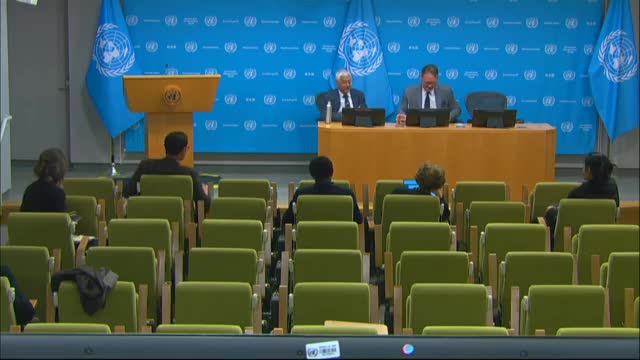U.N. special representative urges rapid deployment of gang-suppression force as Haiti crisis deepens
Get AI-powered insights, summaries, and transcripts
Subscribe
Summary
Carlos Ruiz Massieu, the United Nations special representative for Haiti, said at a U.N. press briefing that Security Council backing for a gang suppression force must be followed by rapid deployment to prevent further deterioration of security and humanitarian conditions.
Carlos Ruiz Massieu, the United Nations special representative for Haiti, said at a U.N. press briefing that Security Council backing for a gang suppression force must be followed by rapid deployment to prevent further deterioration of security and humanitarian conditions.
Ruiz Massieu said the council’s resolution endorsing the transition to a gang suppression force and the extension of a sanctions regime reflect political will that must be turned into operational capacity in the coming months. "The transitional clock is sticking," he said, adding that the U.N. mission needs to be at full strength to advise Haitian authorities and support elections if conditions allow.
Why it matters: Ruiz Massieu described a deteriorating security and humanitarian situation that U.N. reporting cites as more than 16,000 people killed since January 2022 and roughly 1.4 million people affected. He said those figures, and expanding gang activity beyond Port-au-Prince into departments such as Artibonite and the Northwest, make a timely and well-coordinated international response important.
Most urgent details - Timeline and force generation: Ruiz Massieu said the U.N. office established under the Security Council resolution is expected to be in country by March 31 and that full deployment of the gang suppression force (GSF) likely would follow in the months after that date. He cautioned that the standing group of partners charged with force generation will provide the specific timetable.
- Mission staffing and logistics: Ruiz Massieu said the U.N. mission has been restricted by evacuation-capacity limits and that international staff deployment was previously capped at about 17 at a single time. He said the mission has secured evacuation agreements (including with the Dominican Republic) and standby helicopter support and expects to reach roughly 75% of international capacity and 84% of overall capacity by November, with 100% capacity "by the end of the year." "For me, [bringing staff back] has been a priority from day one," he said.
- Humanitarian prepositioning and storms: Journalists asked about World Food Programme (WFP) ability to preposition supplies ahead of an approaching storm. Ruiz Massieu said the situation is "very dire" and that U.N. agencies were working with neighboring countries and drawing on assets from other U.N. missions where possible to preposition relief. He said further information would be shared as details were confirmed.
- Human-rights concerns and drones: Reporters raised a recent report alleging use of kamikaze drones in security operations with civilian casualties, including children. Ruiz Massieu said the U.N. has reported collateral harm in past operations, has advised Haitian authorities and has offered monitoring and training to ensure operations respect human-rights standards, proportionality and accountability. "The government can implement whatever security measures they believe they need," he said, "but they have obligations to abide by the human-rights standards, and we will be working with them on that."
- New U.N. support office and coordination: Ruiz Massieu described a stand-alone U.N. support office intended to provide logistics and administrative support for the GSF as its principal client, while also supporting the U.N. political mission (BINUH) and other partners. He said the office will have operational independence but must coordinate with the U.N. political work to ensure coherent delivery of humanitarian, development and political mandates.
Engagement with gangs and humanitarian access Ruiz Massieu reiterated that the Haitian government regards gangs as criminal actors and not legitimate negotiating partners. He said humanitarian actors require access to populations in gang-controlled areas, and that any future disengagement incentives for gang members would need to be coupled with government resources and reintegration programs such as CBR/DDR (community-based reintegration/disarmament, demobilization and reintegration). He noted that many lower-level gang members are children and that support pathways would be needed if they voluntarily disengage.
What the U.N. will do next Ruiz Massieu said the U.N. will continue to advise Haitian authorities, offer monitoring and training to reduce civilian harm in security operations, work to restore full mission capacity, and coordinate with the standing group of partners responsible for generating the GSF. He said additional assets from nearby U.N. missions could be used to support prepositioning for humanitarian needs.
Journalists pressed on timelines and details; Ruiz Massieu repeatedly deferred exact force-generation timetables to the standing group of partner countries and emphasized that some dates in the resolution should be treated "with a grain of salt" until partners announce force-generation plans.
Ending: The representative concluded by thanking the press for questions and reiterated that the U.N. will press for coordinated, rights-respecting security operations alongside intensified humanitarian preparedness as storm season approaches.
